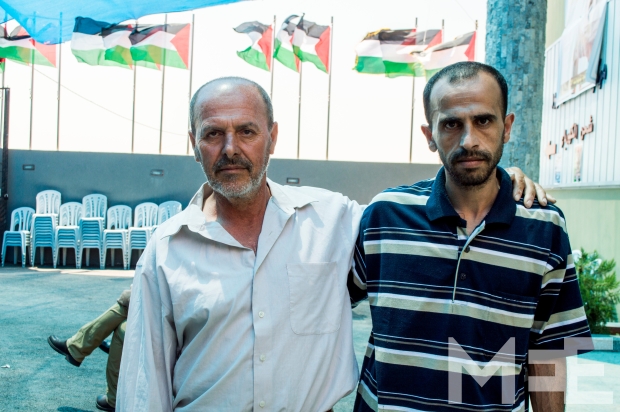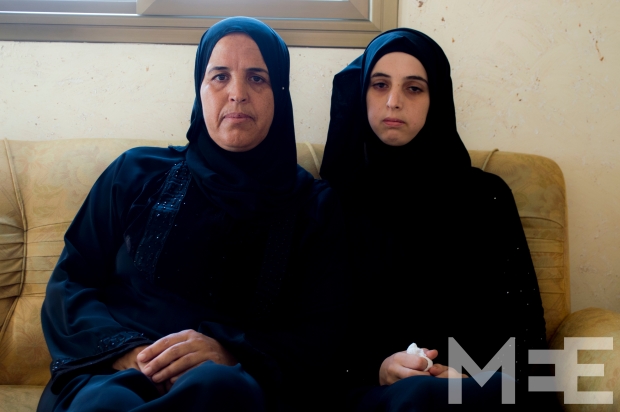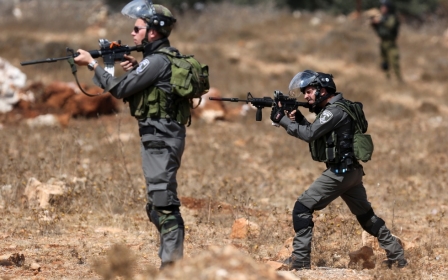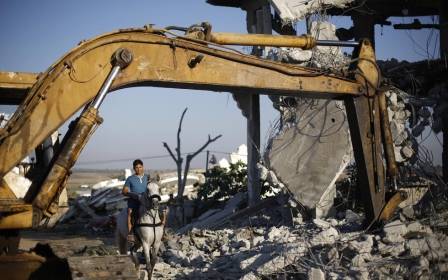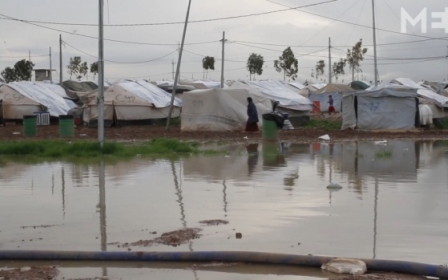Palestine family challenges Israeli claims in man’s death
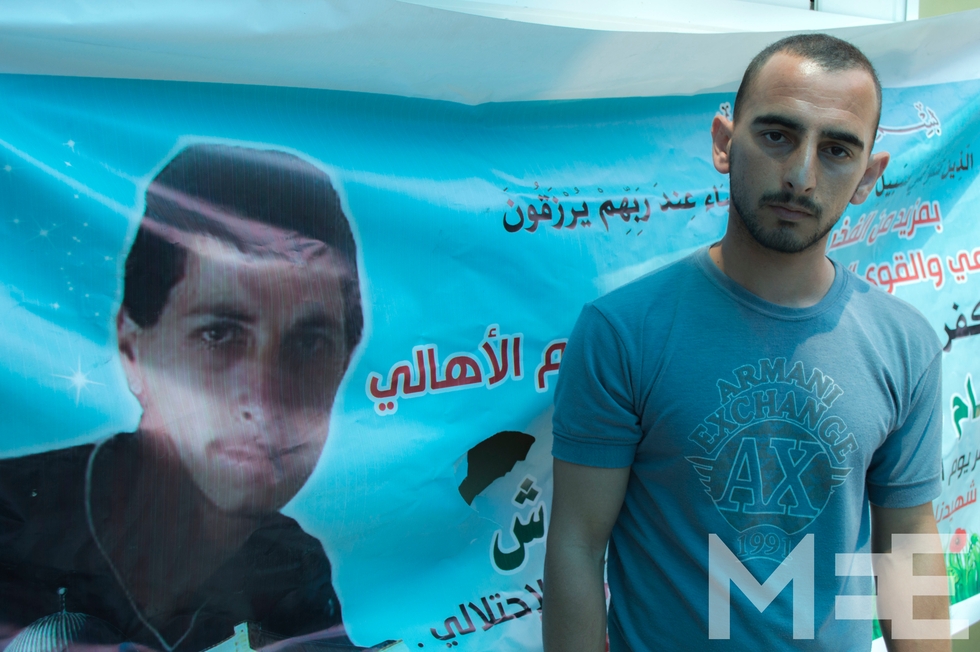
JENIN, West Bank - Mahmoud Amsha Atrash and his twin brother Mohammed Amsha Atrash were in the middle of building a house together. They planned to have a joint wedding and move into their newly built homes on the same day. Mahmoud and Mohammed were born only seconds apart at a small hospital in Jenin, a city in the north of the occupied West Bank. Most of their life has been spent side-by-side.
The pain of losing his brother is physical, Mahmoud said from under the blue tarp of the traditional funeral tent set up in the courtyard of the city hall in Kufr Rai, the village where both of the brothers were raised.
Israeli forces shot dead Mohammed, 24, on 17 August at a checkpoint in the neighbouring district of Nablus.
The Israeli government has said Mohammed asked for a drink of water from Israeli soldiers at the checkpoint, before attacking and stabbing a soldier with a knife. The government says it was then that Israeli forces opened fire.
Mohammed was shot six times and died at the scene. He is at least the 25th Palestinian to be killed by Israeli forces since the start of 2015.
Mahmoud and his family vehemently deny the government’s official statement.
“First, Mohammed didn’t carry a knife. I would know if he had a knife and Mohammed didn’t,” Mahmoud said adamantly.
“Second, we’ve been under occupation for 67 years in this country, we aren’t a political family, but Mohammed was a healthy guy, and I don’t know any Palestinian that would ask an Israeli soldier for a drink of water unless they were dying. Third, trying to stab a soldier at a checkpoint is a suicide mission, and that wasn’t Mohammed.”
Mohammed’s family and friends describe him as a jokester. He had a nickname for everyone, even his parents he seldom called mom and dad, but instead Rabbu and Beshu, a play off their names, Rabia and Besham.
'He was better at everything'
Mahmoud has spent the last few days recounting memories of his brother.
When Mahmoud was young he and Mohammed would skip school to go hunting in the mountains for small birds. He misses those days more than he can express, Mahmoud said, his face torn with anguish, but without shedding a tear.
“Mohammed was always better than me at hunting,” his tormented expression breaks out in a smile. “He was better at everything. He might have only been born two seconds before me but he was the older one, that was obvious to anyone.”
Mohammed was always taking the blame for his siblings, his father told Middle East Eye, sitting next to Mahmoud.
“When Mahmoud did something wrong Mohammed would always insist he had done it and take the punishment,” Besham said smiling.
Mohammed dropped out of school when he was 15 and began working odd jobs to help his father, who has heart problems, support their family.
Eventually Mohammed picked up painting, and became good at it. The intricately designed ceiling in the living room of his family’s home was painted by Mohammed, his sister Masada points out.
Masada was at al-Quds Open University paying for her first semester of her bachelor’s degree when she got the call informing her that Mohammed had been killed.
“Mohammed was the one who gave me the money to pay for the classes,” Masada said, unable to speak without her voice cracking through tears.
“He didn’t finish school but he insisted I did. I have a diploma in early child care because of him, and I work, but Mohammed insisted I go to university too,” she said.
Masada can’t imagine life without Mohammed. He was her joy, she said. There was no situation, no matter how serious, that Mohammed couldn’t make light of.
Masada said she will start university and finish her bachelor’s degree, not for herself, but for Mohammed.
Mohammed’s mother Rabia sits next to Masada in the family’s small living room, both dressed head-to-toe in black, doing their best to hold back tears.
'I know my son'
Rabia is in shock at how Mohammed could have been killed by soldiers. She said he was never political, always putting work and family before anything.
“From when he was a young teenager Mohammed worked. Work was his life. Even when he was killed he was coming home from work in Ramallah just for two days because then he planned to return to Ramallah for work,” she said.
When reports first came in that a young man had been killed in Nablus, they did not specify the man’s name, because he had no identification on him. Mohammed’s mother said his ID was forgotten at home, and that is why he was returning to Kufr Rai in the first place.
Witnesses at the scene told Mohammed’s family that he was asked to step out of the car because of his lack of identification. His family believes if he had not forgotten his ID at home, Mohammed would still be alive.
Every member of Mohammed’s family is adamant that the official story behind Mohammed’s death, the stabbing of the Israeli soldier, is false. They believe the story was crafted to protect the shooters, because of the new changes to the Israeli military’s rules of engagement.
A week before Mohammed’s death, Hebrew media speculated a change in Israeli forces’ policy concerning interactions between soldiers in the West Bank and Palestinians. The change allegedly specified that troops were not to shoot at Palestinians unless the suspect posed an immediate threat to life.
While Israeli authorities would not comment to MEE on their rules of engagement, citing security reasons, previous court rulings have suggested that forces were permitted to shoot suspects in the extremities even when there was no threat to life, as long as warning shots were first fired into the air.
Mohammed’s family pointed out that following the change, four men, including Mohammed, were shot by Israeli forces at checkpoints following alleged knife attacks. They believe saying Mohammed was trying to stab a soldier was an excuse for his death.
“I know my son, I am his mother,” Rabia said through tears. “There is no way in my mind that I could possibly believe that Mohammed stabbed anyone, even a soldier, especially not a soldier.”
Additional reporting provided by Abed al Qaisi
New MEE newsletter: Jerusalem Dispatch
Sign up to get the latest insights and analysis on Israel-Palestine, alongside Turkey Unpacked and other MEE newsletters
Middle East Eye delivers independent and unrivalled coverage and analysis of the Middle East, North Africa and beyond. To learn more about republishing this content and the associated fees, please fill out this form. More about MEE can be found here.


